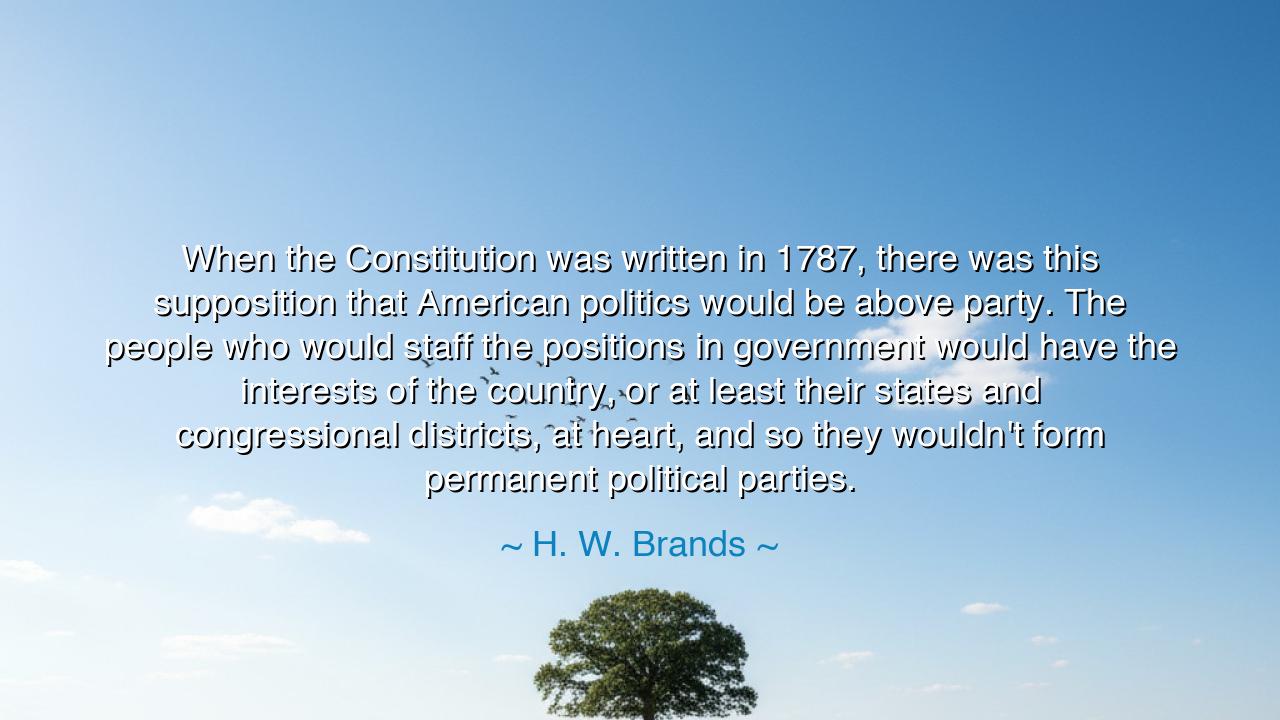
When the Constitution was written in 1787, there was this
When the Constitution was written in 1787, there was this supposition that American politics would be above party. The people who would staff the positions in government would have the interests of the country, or at least their states and congressional districts, at heart, and so they wouldn't form permanent political parties.






“When the Constitution was written in 1787, there was this supposition that American politics would be above party. The people who would staff the positions in government would have the interests of the country, or at least their states and congressional districts, at heart, and so they wouldn't form permanent political parties.” Thus spoke H. W. Brands, a historian and philosopher of the American spirit, who gazed upon the founding of the Republic not merely as an event in time, but as an idea in eternity. His words remind us that the Founders’ dream was one of unity — of a government guided not by faction or ambition, but by virtue and reason. In the infancy of the Republic, they believed, or at least hoped, that men could govern as patriots before partisans, that they could rise above the quarrels of faction and serve the common good as stewards of a shared destiny.
When the Constitution of 1787 was crafted in Philadelphia, the air was thick with debate and conviction. Yet through all their disagreements, the framers shared one faith: that the Republic, newly born, would be tended by citizens who sought the nation’s welfare above their own. They distrusted factions, those organized groups of passion and interest that could, in their eyes, tear apart the delicate fabric of liberty. George Washington, in his Farewell Address, would later warn the people that political parties were a “frightful despotism,” a danger to both reason and unity. He believed that once men chose allegiance to a party, they would cease to choose allegiance to truth.
But the heart of man, though noble in aspiration, is divided by nature. The ideal of being “above party” soon gave way to the reality of human difference. For even as the ink of the Constitution dried, opposing visions of the Republic began to form. Alexander Hamilton, bold and pragmatic, saw in government a strong and guiding hand, necessary to bind the nation’s commerce and honor. Thomas Jefferson, cautious and idealistic, saw liberty endangered by such strength and dreamed of a government limited, humble, and close to the people. Thus, even before the nation had found its voice, two notes — one of power, the other of liberty — began to sound in discord. The Federalists and the Democratic-Republicans were born, and with them, the first great parties of the United States.
Brands’s reflection on this transformation is not merely historical; it is philosophical. He calls us to consider the tragedy of lost innocence — how a Republic founded on unity became divided by allegiance, how the servants of the nation became the soldiers of ideology. The Founders had imagined a government of virtue, where wisdom and public spirit would prevail over ambition. Yet the very structure they built — a system of competing interests, checks and balances, and open debate — made the rise of parties inevitable. For where there is liberty, there will be difference, and where there is difference, there will be struggle. What they sought to escape was in truth the very price of freedom.
And yet, the story is not one of despair. Though parties rose and the dream of unity dimmed, the Republic did not perish. The competition of ideas — fierce, imperfect, and often bitter — became the engine of democracy itself. Abraham Lincoln, in the century that followed, stood as proof that greatness could still rise above faction. He was born of a party, yes, but he governed with the heart of a patriot. In the midst of a nation divided by war, he spoke not as a partisan but as a guardian of a higher cause — the preservation of the Union. His example reminds us that even within the storm of division, the call to serve the common good can still be heard, if only we have ears to listen.
So what, then, does Brands ask of us with his words? He asks us to remember what the Founders believed — not to pretend that parties can vanish, but to recall that country must come before party. The machinery of government may change, but the soul of governance — that ancient duty to serve truth and justice — must never be forgotten. To be “above party” is not to reject all difference, but to remember that difference is not enmity. The Republic was not meant to be a battlefield of factions, but a meeting place for citizens, each bearing a fragment of wisdom that, when joined with others, forms the whole.
Let this be our lesson: that we, too, are the inheritors of the Founders’ fragile dream. When we argue, let it be for the sake of the nation, not the triumph of our side. When we choose our leaders, let it be for their virtue, not their slogans. When we speak of government, let us remember that it is not they, but we, who are the Republic. And when we feel the pull of partisanship, let us recall that true patriotism does not whisper, “my party, right or wrong,” but declares with steady heart, “my country — may it always be right, and if it errs, may I help to set it right again.”
For though the Founders’ hope of a politics above party may never be fully realized, it remains a star to steer by — a reminder that the purpose of government is not victory, but virtue; not domination, but duty. And so long as we remember that, the Republic, though tested, will endure.






AAdministratorAdministrator
Welcome, honored guests. Please leave a comment, we will respond soon